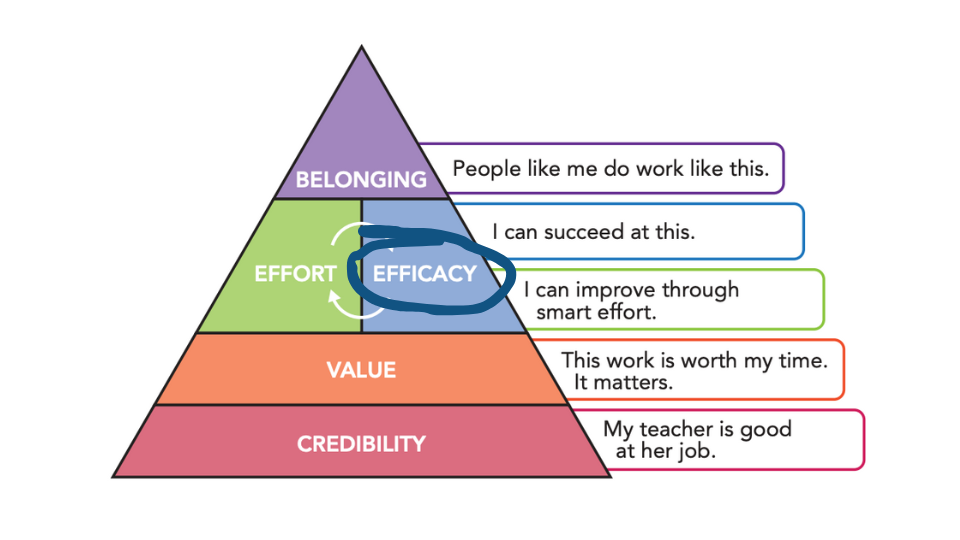Dear colleague,

According to Efficacy belief OG Dr. Albert Bandura, there are four keys to the cultivation of Efficacy in an individual. I'll list them, describe them briefly, and give a practical pointer or two.
- Mastery Experiences — that is, moments when a student sees or feels proof that they've grown toward mastery. In other words, they've got to SUCCEED in order to believe they can succeed, and then that belief (Efficacy) will lead to more success. (Yep, it's a paradox. Which is basically how you know it's true.
I talk about it more on p. 169 of The Will to Learn.)
- Ideas:
- In classes like ours with kids spread all across the ability and preparedness spectrum, this means we've got to be mindful of defining success as growth toward mastery. That's one of the keys to a good Everest Statement and good instruction on goal-striving, improvement, etc.
- And of course, creating experiences where variations in student performance are to be expected (e.g., Pop-Up Debates).
- Ideas:
- Vicarious Experiences — i.e., whereas mastery experiences are seeing myself succeed, vicarious experiences are seeing others (especially my peers) succeed.
- Ideas:
- Model what you're teaching toward with student samples. Reading through a stack of readable writing (p. 172 of These 6 Things) to make a Roots and Shoots List (p. 181 of These 6 Things)? Pick out a sample or two that exemplifies what you're after.
- Point out exciting student work. I love doing this during Pop-Up Debates especially (see Chapters 4 [Argument] and 7 [Speaking/Listening] in These 6 Things).
- Ideas:
- Verbal Persuasion — i.e., you use your words to stoke their belief in their ability to succeed.
- Ideas:
- Weave your belief in students into your Mini-Sermons (Strategy #4 in Will to Learn) and/or your Everest Statement explications (Chapter 1 in These 6 Things).
- When you're having a Moment of Genuine Connection with a student (Strategy #1 in Will to Learn), instead of saying something like “Good job,” get specific about the wise efforts you see the student putting in or how the mistakes they've made recently don't shake your belief in their ability.
- Ideas:
- Emotional and Physiological States — i.e., you're trying to create a calm, positive environment where students can have an enjoyable and productive learning experience.
- Ideas:
- “Enjoyable and productive learning experience” is what my simple Classroom Management Guide is all about. Check it out.
- Celebrate times when you see students stay calm and focused when under pressure. Teach them (via Woodenization) how to do this.
- Ideas:
Lots of interesting things we can take away from Dr. Bandura's four keys to efficacy.
Mad respect, Dr. B.
DSJR
Leave a Reply